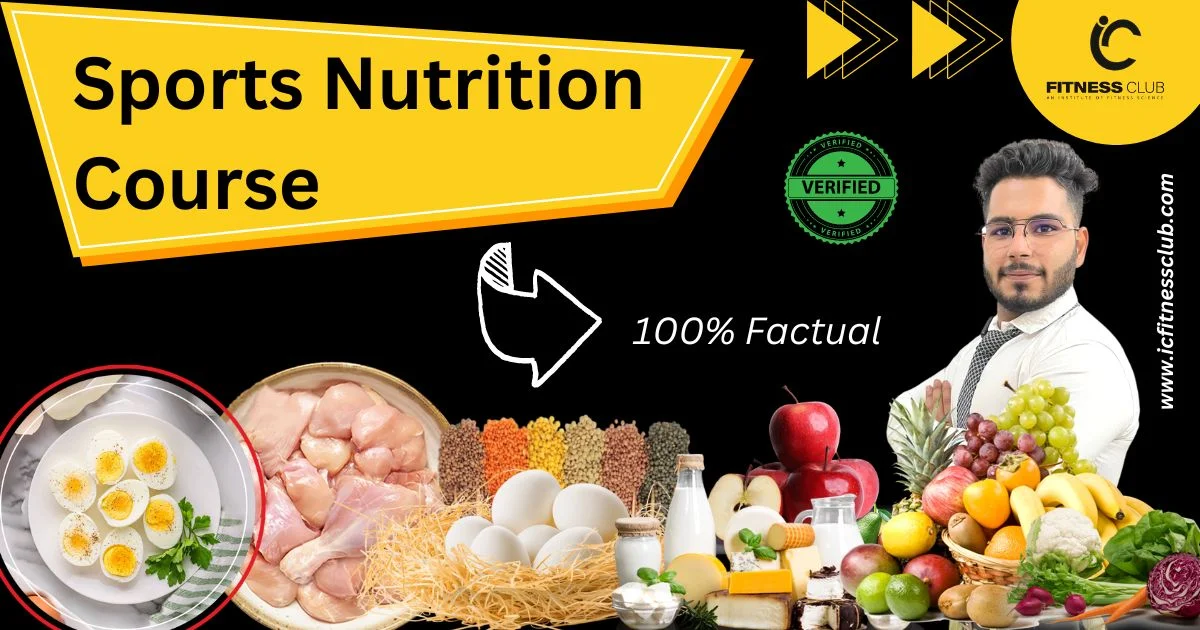Sports Nutrition Course in Delhi – IC Fitness Club
A sports nutrition course is a type of educational program that focuses on teaching students about the relationship between nutrition and physical performance. The course covers topics such as the nutritional needs of athletes, the impact of diet on athletic performance, and strategies for optimizing sports nutrition. It is designed for students who are interested in pursuing careers in sports nutrition, sports medicine, or related fields. The course may include lectures, discussions, hands-on activities, and practical assignments designed to help students gain a deep understanding of the subject.
The eligibility Criteria to become a sports nutritionist include
- Education: IC Fitness Club requires at least a matriculation degree or certificate to enroll in the Diploma in Sports Nutrition Course.
- Age – You must be at least 18 years old
- Experience: Many certifying organizations require candidates to have some practical experience working in the field of sports nutrition, such as through an internship, practicum, or volunteer work.
- Examination: IC Fitness Club requires candidates to pass an exam to demonstrate their knowledge and competency in sports nutrition. The exam typically covers topics such as anatomy and physiology, nutrition, and the impact of diet on athletic performance.
- Continuing Education: IC Fitness Club requires their certified sports nutritionists to maintain their certification by completing continuing education courses on a regular basis.
Skills a sports nutritionist includes
A sports nutritionist is someone who helps athletes and active individuals optimize their diets for improved performance and recovery. The following are some of the key skills required for success in this field:
- Knowledge of nutrition science: A deep understanding of the science of nutrition is essential for a sports nutritionist to be able to provide accurate and effective advice to clients.
- Knowledge of exercise physiology: A sports nutritionist must understand how the body responds to exercise and the role that nutrition plays in this process.
- Assessment skills: A sports nutritionist must be able to assess the nutritional needs of their clients and make recommendations based on individual needs and goals.
- Communication skills: A sports nutritionist must be able to communicate complex nutritional information in a way that is easy for clients to understand.
- Counseling skills: A sports nutritionist must be able to work with clients to help them make positive changes to their diets and achieve their nutritional goals.
- Attention to detail: A sports nutritionist must be meticulous in their record keeping and documentation to ensure that clients receive the best possible care.
- Adaptability: Sports nutritionists must be able to adapt their advice to meet the changing needs and goals of their clients as they progress in their athletic careers.
- Passion for health and wellness: A sports nutritionist should have a strong interest in health and wellness, and be committed to helping their clients achieve their full potential.
Syllabus of a Sports Nutrition Course
- Introduction to sports nutrition: Overview of the field of sports nutrition, including the history and evolution of the field.
- Anatomy and Physiology: Understanding the structure and function of the human body and how it responds to exercise.
- Energy metabolism: Understanding the role of macronutrients (carbohydrates, proteins, and fats) and micronutrients (vitamins and minerals) in energy production and utilization.
- Sports nutrition for different types of athletes: Specialized nutrition considerations for different types of athletes, including endurance athletes, strength athletes, and team sport athletes.
- Nutrition for performance and recovery: Strategies for optimizing nutrition for improved athletic performance and recovery, including pre-exercise fueling, hydration, and post-exercise recovery.
- Supplementation: Overview of the use of dietary supplements in sports nutrition, including common types of supplements, safety concerns, and evidence-based recommendations.
- Weight management: Understanding the role of body composition and weight in athletic performance and the strategies for optimizing weight for different types of athletes.
- Eating disorders in athletes: Understanding the prevalence and impact of eating disorders in athletes, and strategies for prevention and treatment.
- Current issues in sports nutrition: Discussion of current trends and controversies in sports nutrition, including issues related to doping, ergogenic aids, and health claims.
- Practicum: Practical application of sports nutrition concepts through hands-on activities, case studies, and discussions.
Scope for a sports nutritionist
The scope of sports nutrition refers to the range of responsibilities and tasks performed by professionals in this field. Sports nutritionists play a critical role in helping athletes and active individuals achieve their health and performance goals through proper nutrition. Some of the key areas within the scope of sports nutrition include:
- Assessment: Evaluating the nutritional needs of athletes and active individuals based on their goals, physical characteristics, and training programs.
- Nutrition planning: Developing individualized nutrition plans that meet the unique needs and goals of each client.
- Education: Providing clients with information and guidance on the principles of healthy eating, food choices, and nutrient timing.
- Monitoring and evaluation: Regularly assessing and evaluating the effectiveness of nutrition plans and making necessary adjustments to ensure clients are meeting their goals.
- Research: Participating in and contributing to research in the field of sports nutrition to advance knowledge and best practices.
- Consultation: Providing expert advice and guidance to athletes, coaches, trainers, and sports organizations on sports nutrition-related topics.
- Public health and education: Raising awareness about the importance of nutrition for athletic performance and overall health and wellness.
The scope of sports nutrition is broad, and professionals in this field may work in a variety of settings, including universities, hospitals, fitness centers, sports teams, and private practice. The demand for qualified sports nutritionists is growing, driven by the increasing awareness of the importance of nutrition for athletic performance and overall health.
To know more about IC’s Sports Nutrition Course, Visit below




